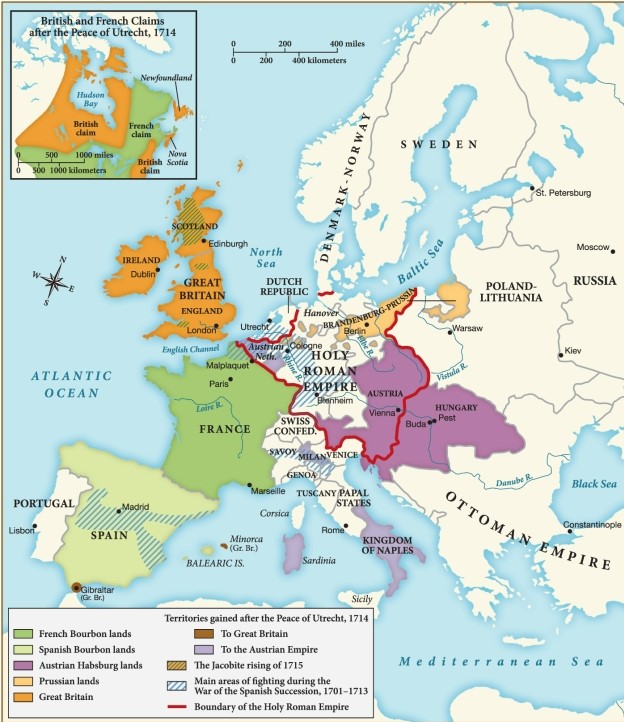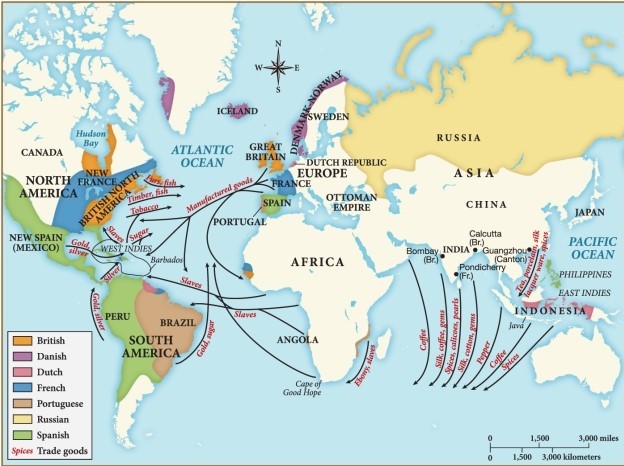Exam 17: The Atlantic System and Its Consequences, 1700-1750
Exam 1: Early Western Civilization, 400,000-1000 B.C.E65 Questions
Exam 2: Near East Empires and the Reemergence of Civilization in Greece, 1000-500 B.C.E64 Questions
Exam 3: The Greek Golden Age, C 500-C 400 B.C.E65 Questions
Exam 4: From the Classical to the Hellenistic World, 400-30 B.C.E65 Questions
Exam 5: The Rise of Rome and Its Republic, 753-44 B.C.E64 Questions
Exam 6: The Creation of the Roman Empire, 44 B.C.E-284 C.E65 Questions
Exam 7: The Transformation of the Roman Empire, 284-600 C.E64 Questions
Exam 8: The Heirs of Rome: Islam, Byzantium, and Europe, 600-75065 Questions
Exam 9: From Centralization to Fragmentation, 750-105065 Questions
Exam 10: Commercial Quickening and Religious Reform, 1050-115065 Questions
Exam 11: The Flowering of the Middle Ages, 1150-121565 Questions
Exam 12: The Medieval Synthesis and Its Cracks, 1215-134065 Questions
Exam 13: Crisis and Renaissance, 1340-149265 Questions
Exam 14: Global Encounters and the Shock of the Reformation, 1492-156065 Questions
Exam 15: Wars of Religion and the Clash of Worldviews, 1560-164865 Questions
Exam 16: Absolutism, Constitutionalism, and the Search for Order, 1640-170065 Questions
Exam 17: The Atlantic System and Its Consequences, 1700-175065 Questions
Exam 18: The Promise of Enlightenment, 1750-178965 Questions
Exam 19: The Cataclysm of Revolution, 1789-179965 Questions
Exam 20: Napoleon and the Revolutionary Legacy, 1800-183065 Questions
Exam 21: Industrialization and Social Ferment, 1830-185064 Questions
Exam 22: Politics and Culture of the Nation-State, 1850-187065 Questions
Exam 23: Empire, Industry, and Everyday Life, 1870-189065 Questions
Exam 24: Modernity and the Road to War, 1890-191465 Questions
Exam 25: World War I and Its Aftermath, 1914-192965 Questions
Exam 26: The Great Depression and World War II, 1929-194565 Questions
Exam 27: The Cold War and the Remaking of Europe, 1945-1960s64 Questions
Exam 28: Postindustrial Society and the End of the Cold War Order, 1960s-198965 Questions
Exam 29: A New Globalism, 1989 to the Present65 Questions
Select questions type
In seventeenth- and eighteenth-century Europe, doctors viewed insanity not as an emotional ailment but as a physical one caused by
(Multiple Choice)
4.8/5  (35)
(35)
In what sense was the Enlightenment an outgrowth of the new science? How was it different?
(Essay)
4.8/5  (39)
(39)
Discuss how the growing wealth and population of European countries in the eighteenth century affected existing social and cultural patterns. Be sure to consider the role that the Atlantic system, agricultural innovations, and the emergence of the middle class played in these developments.
(Essay)
4.7/5  (34)
(34)
Although the publication of William Petty's Political Arithmetick in 1690 raised governments' interest in public health as an element of state power, it had little effect on the health of most people because
(Multiple Choice)
4.8/5  (32)
(32)
Why was religious skepticism a source of great concern to European political authorities during the early years of the Enlightenment? Why didn't political authorities embrace religious reform movements such as Jansenism? In your answer, consider the ways in which new genres such as travel writing could be used to raise questions about the assumed superiority of European Christian beliefs.
(Essay)
4.7/5  (43)
(43)
According to this map, which of the following was a result of the Peace of Utrecht in 1714?

(Multiple Choice)
4.8/5  (35)
(35)
In the 1740s, which of the following regions would most likely export coffee to Europe?

(Multiple Choice)
4.7/5  (41)
(41)
In England, Eliza Haywood was one of a number of eighteenth-century women who showed that they could succeed as
(Multiple Choice)
5.0/5  (38)
(38)
The peace treaties that ended the War of the Spanish Succession set forth what condition for Philip, grandson of Louis XIV, to be confirmed as king of Spain?
(Multiple Choice)
4.8/5  (32)
(32)
Although in Britain's constitutional system the monarch ruled with Parliament, power was still contained within a very small elite in the eighteenth century. What was the reason for this?
(Multiple Choice)
4.8/5  (43)
(43)
Why did George Frideric Handel infuse operatic drama with a religious theme in his 1741 oratorio Messiah?
(Multiple Choice)
4.8/5  (35)
(35)
How were ambassadors chosen for the new diplomatic services that France and other European states created in the seventeenth and eighteenth centuries?
(Multiple Choice)
4.7/5  (40)
(40)
Why did the agricultural revolution in England favor wealthy landowners over small-scale farmers?
(Essay)
4.8/5  (41)
(41)
The legacy of Sir Robert Walpole (1676-1745) can be described as the establishment of which of the following?
(Multiple Choice)
4.9/5  (34)
(34)
What controversial agricultural practice in England that eliminated community grazing rights normally required an act of Parliament?
(Multiple Choice)
4.8/5  (44)
(44)
What factors explain Britain's growth in power during the eighteenth century? Why did the influence and the power of the Dutch decline during this time?
(Essay)
4.9/5  (29)
(29)
The population explosion that took place in Europe around the turn of the eighteenth century can be attributed to
(Multiple Choice)
4.8/5  (38)
(38)
Showing 21 - 40 of 65
Filters
- Essay(0)
- Multiple Choice(0)
- Short Answer(0)
- True False(0)
- Matching(0)